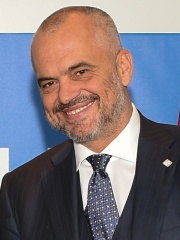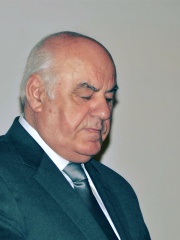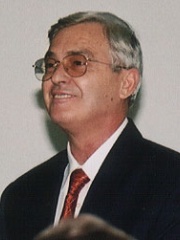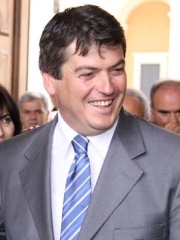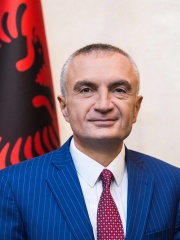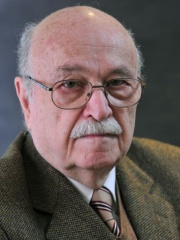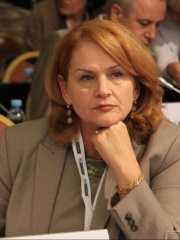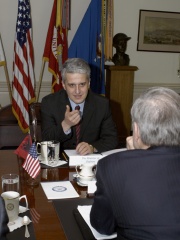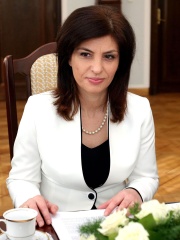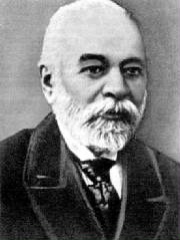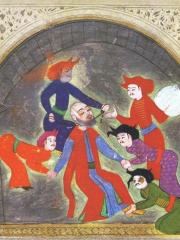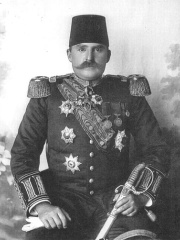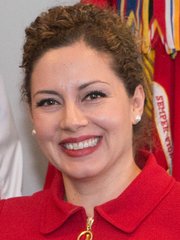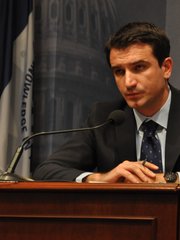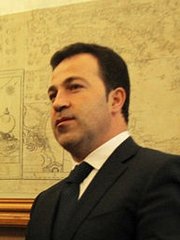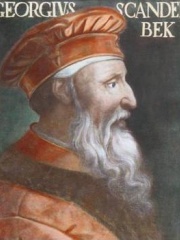

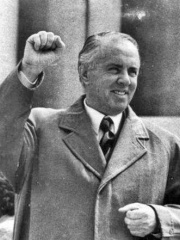
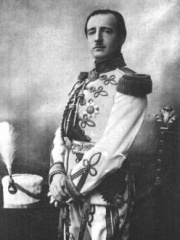
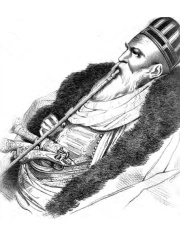
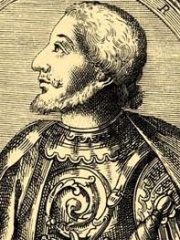
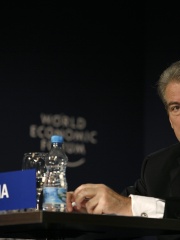
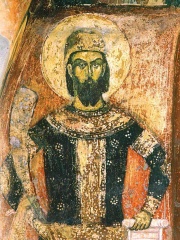
The Most Famous
POLITICIANS from Albania
This page contains a list of the greatest Albanian Politicians. The pantheon dataset contains 19,576 Politicians, 57 of which were born in Albania. This makes Albania the birth place of the 60th most number of Politicians behind Colombia, and Tunisia.
Top 10
The following people are considered by Pantheon to be the top 10 most legendary Albanian Politicians of all time. This list of famous Albanian Politicians is sorted by HPI (Historical Popularity Index), a metric that aggregates information on a biography's online popularity. Visit the rankings page to view the entire list of Albanian Politicians.

1. Skanderbeg (1405 - 1468)
With an HPI of 83.87, Skanderbeg is the most famous Albanian Politician. His biography has been translated into 75 different languages on wikipedia.
Gjergj Kastrioti (c. 1405 – 17 January 1468), commonly known as Skanderbeg, was an Albanian nobleman and military leader who led the League of Lezhë in the Ottoman-Albanian Wars until his death. Skanderbeg is considered to be a major figure of medieval Albanian history and today is the national hero of Albania. A member of the noble Kastrioti family, Skanderbeg was sent as a hostage to the Ottoman court. He graduated from the Enderun School and entered the service of the Ottoman sultan Murad II (r. 1421–1451) for the next twenty years. His rise through the ranks culminated in his appointment as sanjakbey of the Sanjak of Dibra in 1440. During the Battle of Nish in 1443, he deserted the Ottomans and became the ruler of Krujë and nearby areas extending from Petrelë to Modrič. In March 1444, he established the League of Lezhë, with support from local noblemen, and unified the Albanian principalities. In 1451, through the Treaty of Gaeta, Skanderbeg recognized de jure the sovereignty of the Kingdom of Naples over Albania, ensuring a protective alliance, although he remained a de facto independent ruler. In 1460–61, he supported Ferdinand I of Naples (r. 1458–1494) in his wars and led an Italian expedition against John II of Anjou (r. 1453–1470). In 1463, he was earmarked to be the chief commander of the crusading forces of Pope Pius II, but the Pope died while the armies were still gathering and the greater European crusade never took place. Together with Venetians, he fought against the Ottomans during the First Ottoman–Venetian War (1463–1479) until his death. Skanderbeg ranks high in the military history of that time as the most persistent—and ever-victorious—opponent of the Ottoman Empire during its heyday. The central folk hero of the Albanians, Skanderbeg became a central figure in the Albanian National Awakening of the 19th century. He is honored in modern Albania and is commemorated with many monuments and cultural works. Skanderbeg's military skills presented a major obstacle to Ottoman expansion, and many in Western Europe considered him to be a model of Christian resistance against the Ottomans.

2. Anastasius I Dicorus (430 - 518)
With an HPI of 82.03, Anastasius I Dicorus is the 2nd most famous Albanian Politician. His biography has been translated into 59 different languages.
Anastasius I Dicorus (Ancient Greek: Ἀναστάσιος, romanized: Anastásios; c. 431 – 9 July 518) was Roman emperor from 491 to 518. A career civil servant, he came to the throne at the age of 61 after being chosen by Ariadne, the wife of his predecessor, Zeno. His reign was characterized by reforms and improvements in the empire's government, finances, economy and bureaucracy. The resulting stable government, reinvigorated monetary economy and sizeable budget surplus allowed the empire to pursue more ambitious policies under his successors, most notably Justinian I. Since many of Anastasius' reforms proved long-lasting, his influence over the empire endured for centuries. Anastasius was a Monophysite Christian and his personal religious tendencies caused tensions throughout his reign in the empire that was becoming increasingly divided along religious lines.

3. Enver Hoxha (1908 - 1985)
With an HPI of 81.91, Enver Hoxha is the 3rd most famous Albanian Politician. His biography has been translated into 91 different languages.
Enver Halil Hoxha (UK: HOJ-ə, US: HAW-jah; Albanian: [ɛnˈvɛɾ ˈhɔdʒa] ; 16 October 1908 – 11 April 1985) was an Albanian communist revolutionary, statesman and political theorist who was the leader of Albania from 1944 until his death in 1985. He was the First Secretary of the Party of Labour of Albania from 1941 until his death, a member of its Politburo, chairman of the Democratic Front of Albania, and commander-in-chief of the Albanian People's Army. He was the twenty-second prime minister of Albania from 1944 to 1954 and at various times was both foreign minister and defence minister of the country. Hoxha was born in Gjirokastër in 1908. After the Italian invasion of Albania, he helped unify the fractured Albanian communist movement into the Communist Party of Albania. He was elected First Secretary in March 1943 at the age of 34. Less than two years after the liberation of the country, the monarchy of King Zog I was formally abolished, and Hoxha became the country's de facto head of state. As a Marxist-Leninist, Hoxha converted Albania into a one-party communist state. By the 1960s he implemented a program of state atheism and ordered the anti-religious persecution of Muslims and Christians. Implementing his radical program, Hoxha used totalitarian methods of governance. His government outlawed traveling abroad and private proprietorship. The government imprisoned, executed, or exiled thousands of landowners, rural clan leaders, peasants who resisted collectivization, and allegedly disloyal party officials. Hoxha was succeeded by Ramiz Alia, who was in charge during the fall of communism in Albania. Hoxha's government was characterised by his proclaimed firm adherence to anti-revisionist Marxism–Leninism from the mid/late-1960s onwards. After his open break with Maoism in the 1976–1978 period, numerous parties around the world declared themselves Hoxhaist. The International Conference of Marxist–Leninist Parties and Organisations (Unity & Struggle) is the best-known association of these parties.

4. Zog I of Albania (1895 - 1961)
With an HPI of 80.61, Zog I of Albania is the 4th most famous Albanian Politician. His biography has been translated into 61 different languages.
Zog I (born Ahmed Muhtar Bey Zogolli; 8 October 1895 – 9 April 1961) was an Albanian statesman and aristocrat who served as the leader of Albania from 1922 to 1939. At age 27, he first served as Albania's youngest ever Prime Minister (1922–1924), then as president (1925–1928), and finally as King (1928–1939). Born to an aristocratic beylik family in Ottoman Albania, Zogolli was active in Albanian politics from a young age and fought on the side of Austria-Hungary during the First World War. In 1922, he adopted the name Ahmed Zogu. He held various ministerial posts in the Albanian government before being driven into exile in June 1924, but returned later in the year with Yugoslav and White Russian military support and was subsequently elected prime minister. Zogu was elected president in January 1925 and vested with dictatorial powers, with which he enacted major domestic reforms, suppressed civil liberties, and struck an alliance with Benito Mussolini's Fascist Italy. In September 1928, Albania was proclaimed a monarchy and he acceded to the throne as Zog I, King of the Albanians. He married Geraldine Apponyi de Nagy-Appony in 1938, and their only child, Leka, was born a year later. Albania fell further under Italian influence during Zog's reign, and by the end of the 1930s the country had become almost fully dependent on Italy despite Zog's resistance. In April 1939, Italy invaded Albania and the country was rapidly overrun. Mussolini declared Albania an Italian protectorate under King Victor Emmanuel III, forcing Zog into exile. He lived in England during the Second World War but was barred from returning to Albania by the anti-monarchist government led by Enver Hoxha. Zog spent the rest of his life in France and died in April 1961 at the age of 65. His remains were buried at the Thiais Cemetery near Paris, before being transferred to the royal mausoleum in Tirana in 2012.
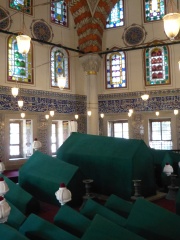
5. Safiye Sultan (1550 - 1619)
With an HPI of 79.14, Safiye Sultan is the 5th most famous Albanian Politician. Her biography has been translated into 43 different languages.
Safiye Sultan (Ottoman Turkish: صفیه سلطان; c. 1550 – January/April 1619) was the Haseki Sultan of the Ottoman Sultan Murad III and Valide Sultan as the mother of Mehmed III. Safiye was one of the eminent figures during the era known as the Sultanate of Women. She lived in the Ottoman Empire as a courtier during the reigns of seven sultans: Suleiman the Magnificent, Selim II, Murad III, Mehmed III, Ahmed I, Mustafa I and Osman II. After the death of Selim II in 1574, Murad took the throne as the new sultan in Constantinople. Safiye was by his side and moved with him to Topkapi Palace; less than a year into his reign she received the title of Haseki Sultan and was given a higher rank than the sultan's own sisters, Şah Sultan, Gevherhan Sultan, Ismihan Sultan and Fatma Sultan. Nurbanu Sultan, Murad's mother, was upset with Safiye's influence on Murad, and wanted to replace her with another concubines of the harem. She even led a faction in the court from 1577 to 1580 in opposition to her mother-in-law and her faction, with the support of Murad's cousins Ayşe Hümaşah Sultan and Hümaşah Sultan. The struggle of these two women to influence the Sultan's life, his decisions and the government groups increased in 1579, as the death of the powerful Grand Vizier Sokollu Mehmed Pasha along with the Sultan self-isolating himself opened the door to the exercise of power for anyone who was close to the Sultan. The conflict between Safiye and Nurbanu reached a crisis point in 1580, and Murad sent Safiye in exile to Eski Saray. She lived there for some years before Nurbanu's death, but Murad brought her back to him sometime after his mother's death in December 1583. Without Nurbanu, she became the most powerful woman in the harem. Moreover, she was not contented with her position, and began to intervene in state affairs, ultimately to become one of the most powerful figures of Murad's reign, and she directed her union network on a larger scale to once again influence state affairs. She strengthened her position in the court when she became the Valide Sultan upon the ascension of her son Mehmed III in 1595, after Murad's death. As Valide Sultan, her personal purse was three times that of the Sultan, the highest level of salary for a person in the empire. During her son's reign, Mehmed consulted her on important matters and did not make a decision if it was not with her consent. Safiye Sultan did not only interfere in interior affairs but also in foreign affairs of the empire. It is known that she corresponded by letters with foreign kings and queens (the most known of them being Elizabeth I of England) and which she established diplomatic relations with them. Like her mother-in-law Nurbanu, she supported a pro-Venetian policy in foreign politics. But in the last years of her son's reign, her meddling in state affairs caused three destructive rebellions and made her immensely disliked by the soldiers and the people: However, until the end of her son's reign, no one could break her dominance and influence over his government. Upon the death of Mehmed III in 1603, she was sent to Eski Saray on 9 January 1604 by her grandson and new sultan Ahmed I, and lived there in retirement without political influence or returning to the court until her death. She died in 1619 and was laid to rest in the tomb of Murad III (Hagia Sophia).

6. Ali Pasha of Ioannina (1750 - 1822)
With an HPI of 78.32, Ali Pasha of Ioannina is the 6th most famous Albanian Politician. His biography has been translated into 40 different languages.
Ali Pasha (1740 – 24 January 1822), commonly known as Ali Pasha of Yanina or Ali Pasha of Tepelena, was an Albanian ruler who served as pasha of the Pashalik of Yanina, a large part of western Rumelia. Under his rule, it acquired a high degree of autonomy and even managed to stay de facto independent. The capital of the Pashalik was Ioannina, which, along with Tepelena, was Ali's headquarters. Conceiving his territory in increasingly independent terms, Ali Pasha's correspondence and foreign Western correspondence frequently refer to the territories under Ali's control as "Albania." This, by Ali's definition, included central and southern Albania, and parts of mainland Greece; in particular, most of the district of Epirus and the western parts of Thessaly and Macedonia. He managed to stretch his control over the sanjaks of Yanina, Delvina, Vlora and Berat, Elbasan, Ohrid and Monastir, Görice, and Tirhala. Ali was granted the Sanjak of Tirhala in 1787, and he delegated its government in 1788 to his second-born Veli Pasha, who also became Pasha of the Morea Eyalet in 1807. Ali's eldest son, Muhtar Pasha, was granted the Sanjak of Karli-Eli and the Sanjak of Eğriboz in 1792, stretching for the first time Ali's control down to Livadia and the Gulf of Corinth, except Attica. Muhtar Pasha also became governor of the Sanjak of Ohrid in 1796–7 and of the Sanjak of Vlora and Berat in 1810. Ali first appears in historical accounts as the leader of a band of Albanian brigands who became involved in many confrontations with Ottoman state officials in Albania and Epirus. He joined the administrative-military apparatus of the Ottoman Empire, holding various posts until 1788, when he was appointed pasha, ruler of the Sanjak of Ioannina. His diplomatic and administrative skills, his interest in modernist ideas and concepts, his popular Muslim piety, his respect towards other religions, his suppression of banditry, his vengefulness and harshness in imposing law and order, and his looting practices towards persons and communities in order to increase his profits caused both the admiration and the criticism by his contemporaries, as well as an ongoing controversy among historians regarding his personality. As his influence grew, his involvement in Ottoman politics increased culminating in his active opposition to the ongoing Ottoman military reforms. He was one of the most prominent leaders in the Ottoman Empire. After being declared a rebel in 1820, he was captured and killed in 1822 at the age of 81 or 82, after a successful military campaign of the Porte against his Albanian rebel forces. The initial Greek uprising in the Morea on the eve of the Greek Revolution began as an extension of Ali Pasha's revolt in Albania.

7. Charles III of Naples (1345 - 1386)
With an HPI of 73.13, Charles III of Naples is the 7th most famous Albanian Politician. His biography has been translated into 39 different languages.
Charles III of Naples, also called Charles the Small or Charles of Durazzo (1345 – 24 February 1386), was King of Naples and the titular King of Jerusalem from 1382 to 1386 as Charles III, and also King of Hungary from 1385 to 1386 as Charles II. In 1381, Charles created the chivalric Order of the Ship. In 1383, he succeeded to the Principality of Achaea on the death of James of Baux.

8. Sali Berisha (b. 1944)
With an HPI of 72.61, Sali Berisha is the 8th most famous Albanian Politician. His biography has been translated into 64 different languages.
Sali Berisha ([saˈli bɛˈɾiʃa] ; born 15 October 1944) is an Albanian conservative politician, former member of Albanian Communist Party and a retired cardiologist who served as the President of Albania from 1992 to 1997 and as the 32nd prime minister of Albania from 2005 to 2013. Berisha has served as chairman of the Democratic Party of Albania since 2022. He has previously held the position of chairman from 1990 to 1992 and 1997 to 2013. He is the leader of the opposition in Albania. Under the Biden Administration, he was barred from entering the United States under Section 7031(c)(1)(A) of the Consolidated Appropriations Act, 2021 due to accusations of 'involvement in significant corruption' and ties to organized crime groups and criminals deemed a 'risk to public safety in Albania. Berisha is also sanctioned by the United Kingdom. Despite major speculation to the contrary, Berisha is still barred from entering the United States as of May 2025. On 9 September 2021, Berisha was expelled by party chairman Lulzim Basha from the Democratic Party's Parliamentary Group due to legal issues with the US Department of State. This decision led to 79-year-old Berisha starting a nation-wide movement to remove Basha as leader of the Democratic Party, causing a major rift in the party's internal structures, between Berisha's and Basha's supporters. On 30 December 2023, Berisha was placed under house arrest due to alleged corruption during his term as Prime Minister. He was released following a court order on 27 November 2024.

9. Prince Marko (1335 - 1395)
With an HPI of 72.01, Prince Marko is the 9th most famous Albanian Politician. His biography has been translated into 28 different languages.
Marko Mrnjavčević (Serbian Cyrillic: Марко Мрњавчевић, pronounced [mâːrko mr̩̂ɲaːʋt͡ʃeʋit͡ɕ] ; c. 1335 – 17 May 1395) was the de jure Serbian king from 1371 to 1395, while he was the de facto ruler of territory in western Macedonia centered on the town of Prilep. He is known as Prince Marko (Macedonian: Kрaле Марко; Serbian Cyrillic: Краљевић Марко, Kraljević Marko, IPA: [krǎːʎeʋit͡ɕ mâːrko]) and King Marko (Macedonian: Kрaл Марко; Serbian Cyrillic: Краљ Марко; Bulgarian: Крали Марко) in South Slavic oral tradition, in which he has become a major character during the period of Ottoman rule over the Balkans. Marko's father, King Vukašin, was co-ruler with Serbian Tsar Stefan Uroš V, whose reign was characterised by weakening central authority and the gradual disintegration of the Serbian Empire. Vukašin's holdings included lands in north-western Macedonia and Kosovo. In 1370 or 1371, he crowned Marko "young king"; this title included the possibility that Marko would succeed the childless Uroš on the Serbian throne. On 26 September 1371, Vukašin was killed and his forces defeated in the Battle of Maritsa. About two months later, Tsar Uroš died. This formally made Marko the king of the Serbian land; however, Serbian noblemen, who had become effectively independent from the central authority, did not even consider to recognise him as their supreme ruler. Sometime after 1371, he became an Ottoman vassal; by 1377, significant portions of the territory he inherited from Vukašin were seized by other noblemen. King Marko, in reality, came to be a regional lord who ruled over a relatively small territory in western Macedonia. He funded the construction of the Monastery of Saint Demetrius near Skopje (better known as Marko's Monastery), which was completed in 1376. Later, Marko became an Ottoman vassal and died on 17 May 1395, fighting against the Wallachians in the Battle of Rovine. Although a ruler of modest historical significance, Marko became a major character in South Slavic oral tradition. He is venerated as a national hero by the Serbs, Macedonians and Bulgarians, remembered in Balkan folklore as a fearless and powerful protector of the weak, who fought against injustice and confronted the Turks during the Ottoman occupation.
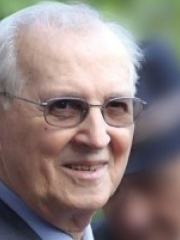
10. Ramiz Alia (1924 - 2011)
With an HPI of 71.80, Ramiz Alia is the 10th most famous Albanian Politician. His biography has been translated into 52 different languages.
Ramiz Alia (Albanian pronunciation: [ɾaˈmiz aˈlia] ; 18 October 1925 – 7 October 2011) was an Albanian politician serving as the second and last leader of the People's Socialist Republic of Albania from 1985 to 1991, serving as First Secretary of the Party of Labour of Albania. He was also the country's head of state from 1982 to 1992. He had been seen as a successor by Enver Hoxha and took power after Hoxha died.
People
Pantheon has 57 people classified as Albanian politicians born between 300 BC and 1979. Of these 57, 21 (36.84%) of them are still alive today. The most famous living Albanian politicians include Sali Berisha, Edi Rama, and Alfred Moisiu. The most famous deceased Albanian politicians include Skanderbeg, Anastasius I Dicorus, and Enver Hoxha. As of April 2024, 5 new Albanian politicians have been added to Pantheon including Lajla Përnaska, Olta Xhaçka, and Erion Veliaj.
Living Albanian Politicians
Go to all RankingsSali Berisha
1944 - Present
HPI: 72.61
Edi Rama
1964 - Present
HPI: 69.23
Alfred Moisiu
1929 - Present
HPI: 68.98
Rexhep Meidani
1944 - Present
HPI: 66.54
Bamir Topi
1957 - Present
HPI: 65.80
Ilir Meta
1969 - Present
HPI: 61.07
Aleksandër Meksi
1939 - Present
HPI: 59.66
Ylli Bufi
1948 - Present
HPI: 55.56
Arta Dade
1953 - Present
HPI: 53.94
Vilson Ahmeti
1951 - Present
HPI: 52.97
Pandeli Majko
1967 - Present
HPI: 52.78
Jozefina Topalli
1963 - Present
HPI: 52.08
Deceased Albanian Politicians
Go to all RankingsSkanderbeg
1405 - 1468
HPI: 83.87
Anastasius I Dicorus
430 - 518
HPI: 82.03
Enver Hoxha
1908 - 1985
HPI: 81.91
Zog I of Albania
1895 - 1961
HPI: 80.61
Safiye Sultan
1550 - 1619
HPI: 79.14
Ali Pasha of Ioannina
1750 - 1822
HPI: 78.32
Charles III of Naples
1345 - 1386
HPI: 73.13
Prince Marko
1335 - 1395
HPI: 72.01
Ramiz Alia
1924 - 2011
HPI: 71.80
Ismail Qemali
1844 - 1919
HPI: 71.02
Kara Ahmed Pasha
1450 - 1555
HPI: 70.27
Essad Pasha Toptani
1863 - 1920
HPI: 68.84
Newly Added Albanian Politicians (2025)
Go to all RankingsLajla Përnaska
1961 - Present
HPI: 43.58
Olta Xhaçka
1979 - Present
HPI: 41.88
Erion Veliaj
1979 - Present
HPI: 40.96
Anila Denaj
1973 - Present
HPI: 40.46
Niko Peleshi
1970 - Present
HPI: 39.42
Overlapping Lives
Which Politicians were alive at the same time? This visualization shows the lifespans of the 21 most globally memorable Politicians since 1700.

